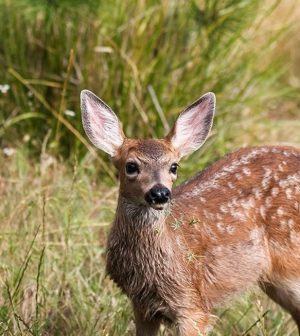- 10 Strategies to Overcome Insomnia
- Could Artificial Sweeteners Be Aging the Brain Faster?
- Techniques for Soothing Your Nervous System
- Does the Water in Your House Smell Funny? Here’s Why
- Can a Daily Dose of Apple Cider Vinegar Actually Aid Weight Loss?
- 6 Health Beverages That Can Actually Spike Your Blood Sugar
- Treatment Options for Social Anxiety Disorder
- Understanding the Connection Between Anxiety and Depression
- How Daily Prunes Can Influence Cholesterol and Inflammation
- When to Take B12 for Better Absorption and Energy
COVID-19 Spotted in Texas Deer

Researchers have confirmed that some white-tailed deer in Texas have COVID-19.
The scientific community has been alarmed by the prospect of deer becoming new hosts for COVID since July, when the U.S. Department of Agriculture found antibodies in white-tailed deer in Illinois, Michigan, New York and Pennsylvania.
The new study suggests that deer should not be overlooked as a possible source of SARS-CoV-2 infection among people as well as domestic and wild animals, according to researchers. They are still trying to learn how COVID is transmitted between people and animals.
“The one thing we know best about SARS-CoV-2 is its unpredictability,” said study author Douglas Watts, professor of biological sciences at the University of Texas at El Paso.
“Therefore, the transmission of the virus from infected deer back to humans, while not likely, may be possible,” he said in a university news release.
Watts and his colleagues studied blood samples collected from deer of various ages in Travis County, Texas, during the first two months of 2021.
More than one-third of the samples showed evidence of SARS-CoV-2 neutralizing antibodies.
They found a significant prevalence among deer that were 1.5 years old. The researchers said this indicates that the disease is rampant among one of the most abundant wildlife species, particularly among males.
The 37% antibody prevalence seen in this study is similar to the 40% reported in deer in the other states.
The findings raise many questions about infection and transmission of the virus among wild and domestic animals, according to lead author Pedro Palermo, manager of the UTEP Border Biomedical Research Center’s Biosafety Level 3 Infectious Disease Research Program lab.
The new findings were recently published in the journal Vector-Borne and Zoonotic Diseases.
More information
The U.S. Centers for Disease Control and Prevention has more on COVID-19 and animals.
SOURCE: University of Texas at El Paso, news release, Dec. 23, 2021
Source: HealthDay
Copyright © 2026 HealthDay. All rights reserved.










